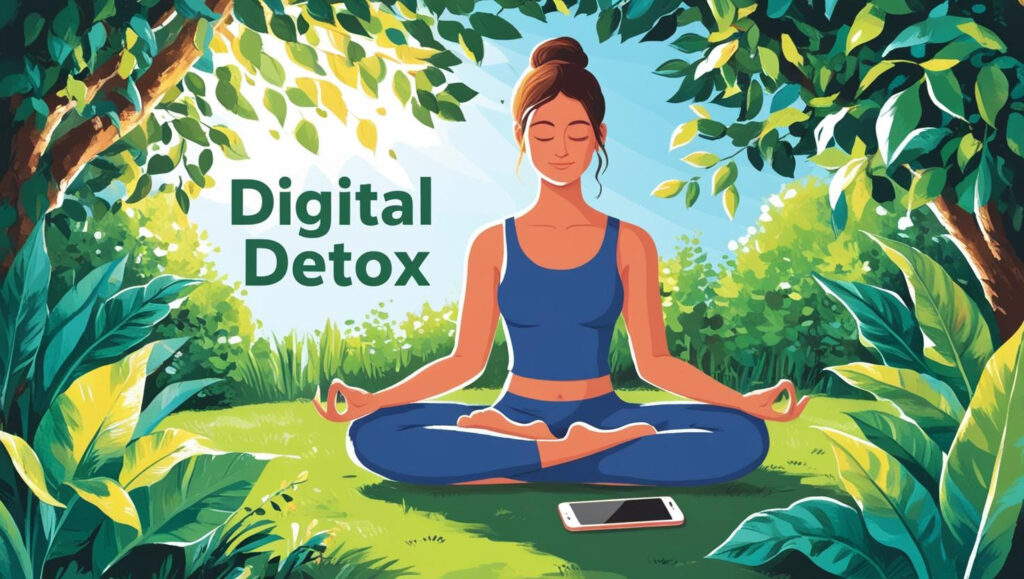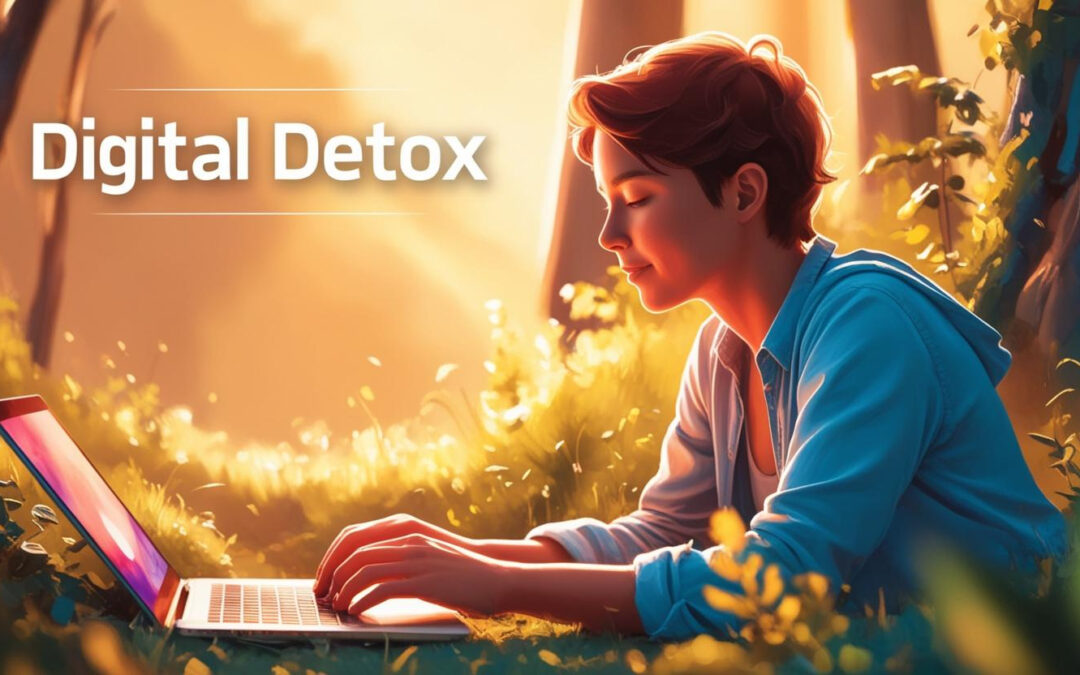Welcome to Your Digital Detox Journey
In our fast-paced, hyperconnected world, the idea of a digital detox shines like a beacon of hope. It’s a chance to step back, breathe, and reconnect with what truly matters. Constant connectivity weighs heavy on our minds, leading to stress and anxiety that can cloud our well-being.
Imagine embarking on an inspirational journey, where you reclaim your peace and rediscover the joys of life beyond the screen. Let this be your invitation to savor every moment!
The Hidden Costs of Constant Connectivity
In our ever-connected world, the allure of screens often comes at a hidden cost. Excessive screen time is linked to rising levels of anxiety and stress. With individuals averaging over 7 hours a day on screens, it’s no surprise that mental health issues are on the rise.
Studies reveal that those who spend more than 4 hours a day on their devices are significantly more likely to report feelings of anxiety and depression. This constant barrage of notifications and updates can create a cycle of stress, making it hard to find peace.
As author and wellness advocate Sherry Turkle wisely states, “We can’t get connected until we disconnect.” This profound insight reminds us that to truly reconnect with ourselves and the world around us, we must first unplug.
Recognizing these hidden costs is the first step toward a more fulfilling and balanced life. Embracing a digital detox can pave the way for deeper connections and a clearer mind.

The Impact of Screen Time on Mental Health
Excessive screen time can have a profound effect on our mental health. As we immerse ourselves in the digital world, we may unknowingly invite anxiety, stress, and sleep disturbances into our lives.
Statistics highlight the alarming correlation between screen usage and mental health issues:
| Screen Time (Hours) | Mental Health Issues |
|---|---|
| 1-2 | Minimal impact |
| 3-4 | Increased anxiety |
| 5+ | Higher risk of depression |
Those who spend more than four hours a day on screens often report significant anxiety and stress. The constant connectivity can disrupt our sleep patterns, leaving us feeling restless and drained. As we scroll through feeds and respond to notifications, our minds are in overdrive, preventing relaxation.
Recognizing these effects is crucial. A digital detox can allow us to reclaim our peace, helping to alleviate anxiety and foster better sleep. Disconnecting offers a path to healing and clarity.
Benefits of Unplugging
Imagine a life where your mind feels clear and your spirit is at peace. This is the delicious gift of a digital detox. When we unplug from our screens, we open the door to mental clarity that can transform our days. With less time consumed by notifications and scrolling, we find room for thoughtful reflection and serenity.
As you step away from the digital noise, you may notice improvements in your sleep patterns, increased focus, and an enhanced sense of creativity. Instead of staring at a screen, you can embrace the joy of a good book, explore your artistic side, or simply bask in the beauty of nature.
Consider the following comparison:
| Activity | Time Spent (Hours) |
|---|---|
| Screen Time | 5+ |
| Reading | 1 |
| Outdoor Activities | 2 |
| Creative Hobbies | 1-2 |
Choosing to unplug allows us to savor enriching experiences, leading to a more fulfilling life. So, step back, breathe deeply, and relish the delicious benefits of disconnecting.
Reconnect with the Earth: Nature’s Embrace
As we step away from our screens, we open ourselves to the delicious embrace of nature. Spending time outdoors is like a refreshing balm for the soul. The gentle rustle of leaves, the warm glow of sunlight, and the vibrant colors of blooming flowers remind us of the beauty that exists beyond our screens.
Consider hiking along a scenic trail, where each step brings you closer to the heart of the earth. Feel the cool breeze on your skin as you breathe in the scent of pine and wildflowers. Or, perhaps you find joy in gardening, nurturing seeds into vibrant life. Each moment spent tending to the soil deepens our connection to nature.
Even a simple act of sitting in a park can be transformative. Close your eyes and listen to the symphony of chirping birds and rustling grass. In these moments, peace washes over you, and clarity emerges. Nature calls us to slow down and reconnect. Embrace the earth in your own way, and discover the profound tranquility that awaits.
Crafting Your Own Digital Detox Plan
Set Specific Phone-Free Times
Start your journey by establishing specific phone-free times. Choose moments during the day when you can unplug. Perhaps during meals or an hour before bedtime. These little windows of time can recharge your mind and spirit.
Create Tech-Free Zones
Next, think about creating tech-free zones in your home. Designate areas like the dining room or bedroom where devices are put away. This encourages meaningful conversations and restful sleep, allowing you to fully enjoy the present moment.
Find Alternatives
Finally, discover delicious activities to fill your newfound free time. Dive into a captivating book, explore nature on a hike, or even try your hand at cooking a new recipe. These activities are not just distractions; they enrich your life and nurture your soul.
Remember, your digital detox plan should be as unique as you are. Personalize it to fit your lifestyle and enjoy the journey!
Creating Your Tech-Free Sanctuary
Designate Your Spaces
Creating tech-free zones in your home is a wonderful way to reclaim your peace. Consider areas where you spend significant time, like your bedroom or dining room. By simply setting boundaries, you create an inviting space free from screens.
Practical Tips for Your Sanctuary
Here are some practical tips to help you establish these zones:
- Keep devices out of the bedroom to promote restful sleep.
- Create a cozy corner in your living room dedicated to reading or relaxation.
- Make the dining table a tech-free zone during meals for deeper connections.
Benefits of Offline Activities
Having designated areas for offline activities encourages mindfulness. You’ll find more time to engage in conversations, enjoy meals, or simply relax with a good book. This sanctuary becomes a delightful escape from the digital world, allowing you to reconnect with yourself and your loved ones.

Frequently Asked Questions About Digital Detox
How long should a digital detox last?
The duration of a digital detox can vary. Some find that a weekend is enough to recharge, while others may benefit from a week or more. Start small, perhaps with one day a week, and gradually extend it as you feel more comfortable. The key is to find what works best for you.
What if I need my phone for work?
It’s understandable to worry about disconnecting when work demands your attention. Consider setting clear boundaries. Dedicate specific hours for work-related tasks and keep your phone away during personal time. You can also explore apps that limit distractions during non-work hours.
How to overcome common hurdles?
Remember, it’s okay to feel uneasy at first. Be kind to yourself! Start by replacing screen time with delicious activities like reading, walking in nature, or practicing mindfulness. The more you engage in these enriching experiences, the easier it will become to embrace a digital detox.
Final Thoughts: Relishing the Freedom of Less
As we wrap up our journey into the world of digital detox, it’s clear that stepping away from screens can bring a plethora of benefits. Enjoying mental clarity, deeper sleep, and enhanced creativity are just a few of the delicious rewards waiting for you.
Embrace the joys of disconnecting and discover a newfound freedom. By unplugging, you open the door to richer connections with yourself and the beautiful world around you.
So why not take that first step? Challenge yourself to a digital detox and relish in the simple pleasures of life. Your spirit will thank you!






Stepping away from the constant stimulation and demands of electronic devices through a digital detox offers a valuable opportunity for the mind to rest and recalibrate, reducing the overwhelming nature of constant notifications and information overload that can contribute to stress and anxiety. By intentionally disconnecting, individuals can regain focus, improve their sleep quality by limiting exposure to blue light before bed, and cultivate a greater sense of presence in their immediate surroundings, fostering more meaningful real-life connections and ultimately contributing to improved mental well-being.